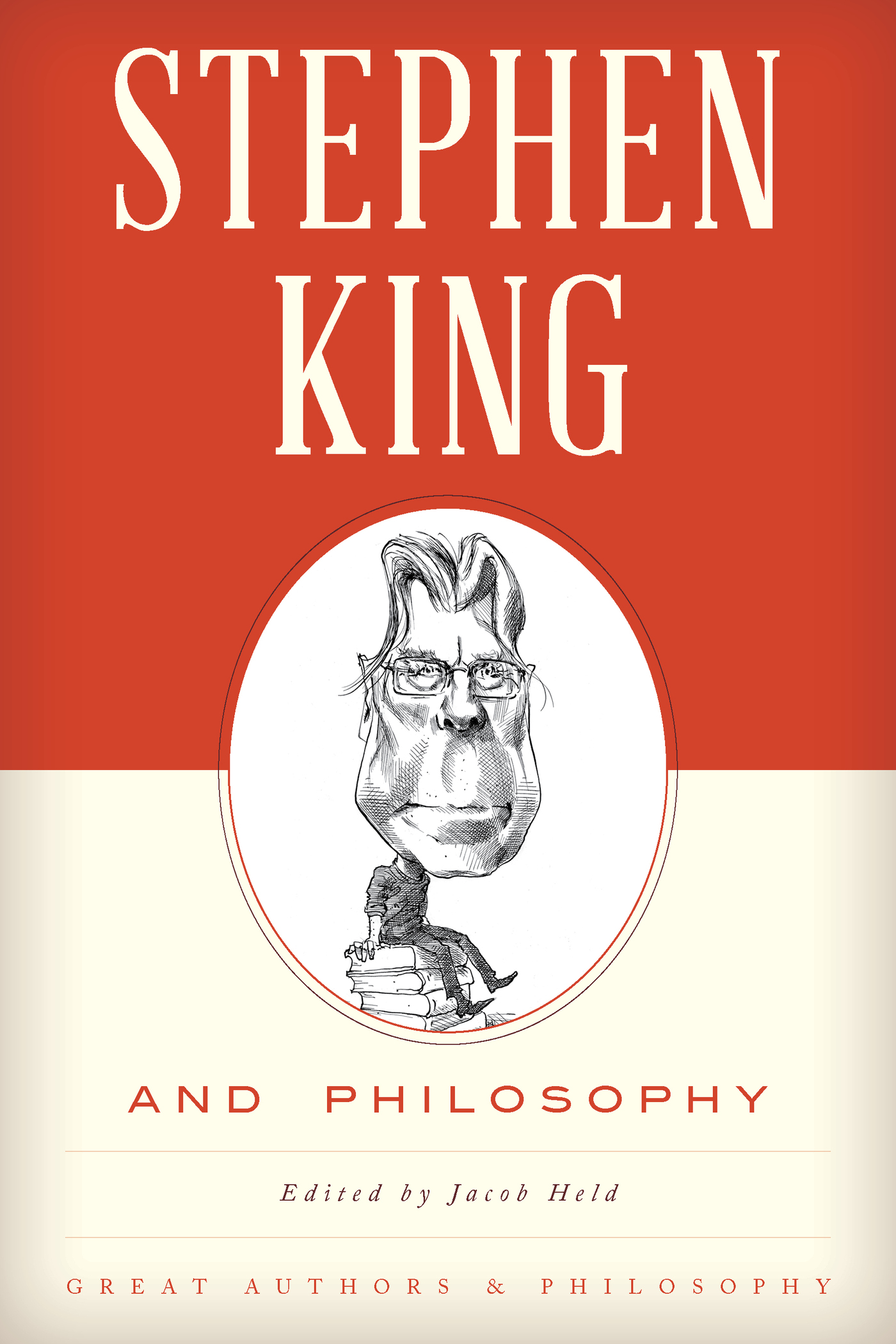Stephen King
and Philosophy
Great Authors in Philosophy
General Editor: Jacob M. Held,
editor of Dr. Seuss and Philosophy
The Great Authors and Philosophy series is for anyone who ever wondered about the deeper ideas in their favorite authors books. Comprising entertaining, concise, and accessible takes on the philosophical ideas that classic and contemporary authors and their work convey, the books in this series bring together philosophical perspectives enhanced and illuminated by beloved stories from our culture.
Current and Forthcoming Titles in the Series
Stephen King and Philosophy, edited by Jacob M. Held
Jane Austen and Philosophy, edited by Mimi Marinucci
Mark Twain and Philosophy, edited by Alan Goldman
Stephen King
and Philosophy
Edited by Jacob M. Held
ROWMAN & LITTLEFIELD
Lanham Boulder New York London
Published by Rowman & Littlefield
A wholly owned subsidiary of
The Rowman & Littlefield Publishing Group, Inc.
4501 Forbes Boulevard, Suite 200, Lanham, Maryland 20706
https://rowman.com
Unit A, Whitacre Mews, 26-34 Stannary Street, London SE11 4AB, United Kingdom
Distributed by NATIONAL BOOK NETWORK
Copyright 2016 by Rowman & Littlefield
All rights reserved. No part of this book may be reproduced in any form or by any electronic or mechanical means, including information storage and retrieval systems, without written permission from the publisher, except by a reviewer who may quote passages in a review.
British Library Cataloguing in Publication Information Available
Library of Congress Cataloging-in-Publication Data
Names: Held, Jacob M., 1977 editor.
Title: Stephen King and philosophy / edited by Jacob M. Held.
Description: Lanham : Rowman & Littlefield, 2016. | Series: Great authors and philosophy | Includes bibliographical references and index.
Identifiers: LCCN 2016016519 (print) | LCCN 2016020596 (ebook) | ISBN 9781442253841 (pbk. : alk. paper) | ISBN 9781442269767 (electronic)
Subjects: LCSH: King, Stephen, 1947Criticism and interpretation. | Philosophy in literature.
Classification: LCC PS3561.I483 Z8784 2016 (print) | LCC PS3561.I483 (ebook) DDC 813/.54dc23
LC record available at http://lccn.loc.gov/9781442253841
 TM The paper used in this publication meets the minimum requirements of American National Standard for Information Sciences Permanence of Paper for Printed Library Materials, ANSI/NISO Z39.48-1992.
TM The paper used in this publication meets the minimum requirements of American National Standard for Information Sciences Permanence of Paper for Printed Library Materials, ANSI/NISO Z39.48-1992.
Printed in the United States of America
For Wallace,
One of my reminders of what matters.
Introduction
Jacob M. Held
On Writing Popular Philosophy
Ive been working in the philosophy and popular culture genre for years, since the very beginning of my career, in fact. My career is intimately tied to, and in fact inseparable from, work on popular culture. But it has come at a cost. Ive had to combat naysayers who diminish my work as lacking in some aspect they deem essential to legitimate philosophy or academic scholarshipperhaps its too readable, too relatable. Real philosophy is dense, impenetrable, so esoteric as to be unknown, and so obscure as to be irrelevant. But Ive also had to combat my own expectations, the suspicion that even if I dont recognize the naysayers, their intuitions may be correct. Maybe what I do is trivial, the philosophical equivalent of a Big Mac and fries.
I have reconciled myself with myself on this matter; and the answer lies between nihilism and eudaimonism. Anything I do, in the cosmic view of things, will be trivial. Everything will be forgotten. And even if its remembered, why does that matter? If I seek to emulate Aristotle or Kant, and should I succeed, what do I gain? They gain nothing from their notoriety; they are long dead. And were they never to have appeared would the world have missed them, lamented the absence of unknown geniuses? Surely not. Someone wouldve filled their vacant seats, someone else who now would also be long dead. And so here nihilism creeps in. Nothing matters in the long run because, as the economist John Maynard Keynes (18831946) so eloquently put it, in the long run were all dead. But it cant end there. Rejecting the desire for reputation or recognition frees one up for something else, namely, magnanimity, or eudaimonia. So I reject the criticisms, both proffered by my discipline and academic peers, and leveled against me by my own worst critic, myself, and accept who I in fact am, a philosopher who cant but engage with popular culture, who has to do philosophy that is relevant, relatable, and yes... fun. Its all I can do, so Ill do it well. But then theres always someone ready with a jibe, ready to force me to relive, yet again, this inner drama.
So Id like to begin with an anecdote. This series, the Great Authors and Philosophy series, was years in the making. There were some false starts, but finally I got the call, or rather the e-mail, and then the contract. I was offered two books to start the series: one on Stephen King and another on Jane Austen. I jumped at the chance to edit the Stephen King book. Itd be an excuse to read a ton of Stephen King, plus its truly ripe material for this style book. I began sending out a call for abstracts and soliciting essays from friends and colleagues. Then I got a response from one of my colleagues, a friend, who actually contributed to this book, a response that irritated me.
I had sent out an e-mail indicating that the inaugural volume of the Great Authors series would be a book I was editing on Stephen King, and I received the response: When did Stephen King become a great author? My first thought: When did you become a critic, you ass? But I stepped back and realized that in this singular sentence were all the criticisms waged against me, my work, and my field for the past decade. And a response came to me. Why had I not seen this before? I dont have to justify what I do. The burden of proof is on the critic. And this type of dismissal of popular art, culture, or philosophy is more often indicative of an unjustified snobbery than a legitimate assessment of rigor or worth.
The type of criticism indicated above, whether it is aimed at philosophy and popular culture generally or Stephen King specifically evinces a repugnant snobbery. Now, Im not a relativist. All things are not equally valuable. I am not against standards or judgment. Standards are good, and standards need to be maintained, but standards relevant to and tied to the essence of a thing or practice. Snobbery is something else; it speaks to the snob, not to the quality of that which they criticize. Consider the snob.
The idea that King isnt a great author, but instead pulp or garbage fiction, is not uncommon. He even adopts a self-deprecating demeanor when he equates his work to the literary equivalent of McDonaldsnot the finest cuisine available, but good enough and enjoyed by millions. So someone disparages you and your choice of reading material, say, Salems Lot, while that individual chooses a classic, A Farewell to Arms. Your popular fiction is about vampires, the other persons is about war. Yours is only forty years old, his or hers almost ninety. Or perhaps someone criticizes your taste in films or television programs as juvenile. For instance, a snob may claim that men dressing in drag and engaging in slapstick humor is beneath them, juvenile, base. Monty Python and the Kids in the Hall is lowbrow humor. But the same phenomena, namely, cross-dressing tomfoolery, is acceptable and high art if its done by The Bard. These types of examples point out the foolishness behind the snobs critique and lay bare its motivation, not the maintenance of high standards for comedy or literature, but the maintenance of ones position as a snob or critic. One who lauds Shakespeare while disparaging Monty Python both fails to appreciate Monty Python, and often merely demonstrates that they have tied their self-worth to the stature of Shakespeare. If Shakespeare is great, then surely some of that greatness rubs off on the critic who lauds Shakespeare and sets him above all others. They are the elite and occupy a privileged position because they can appreciate truly great works like those of their chosen author, Shakespeare. Their sense of worth is tied to their tastes, their consumptive habits, and in order to maintain their status as better than, they must first disparage the common, or the banal. Snobbery is nothing short of the adult version of playground politics, raising ones own position by lowering another, and just as on the playground it says nothing about the victim of the insult and everything about the instigator. Snobbery of this sort cannot go unchecked. It is not legitimate criticism. So although Ive made peace with this line of criticism, for the most part, Id be remiss if I didnt respond, even preemptively, in a book on Stephen King and philosophy.

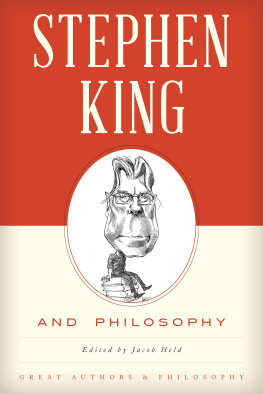
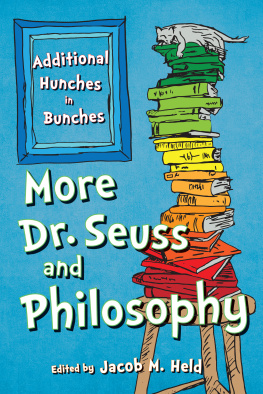
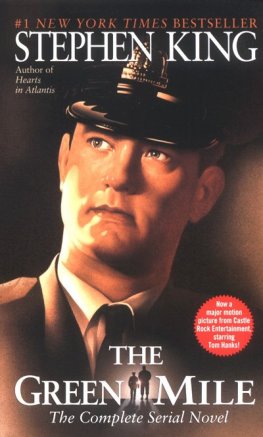








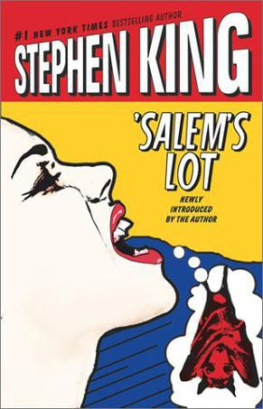
 TM The paper used in this publication meets the minimum requirements of American National Standard for Information Sciences Permanence of Paper for Printed Library Materials, ANSI/NISO Z39.48-1992.
TM The paper used in this publication meets the minimum requirements of American National Standard for Information Sciences Permanence of Paper for Printed Library Materials, ANSI/NISO Z39.48-1992.